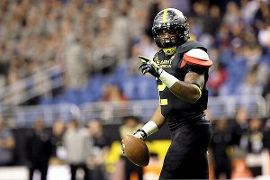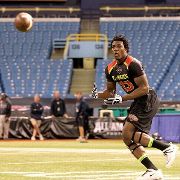|
It was easy for Derrick Henry to get caught up in the moment. It would prove much harder for him to live it down. Henry did what he was supposed to do as a rising junior in 2011: He bought the University of Georgia's recruiting pitch hook, line and sinker. At Georgia's one-night summer football camp, appropriately dubbed "Dawg Night," Henry bit off more than he could chew. He fell in love with the sights and sounds of Athens, he fell in love with Mark Richt and the coaching staff, and he fell in love with the idea of becoming the next Herschel Walker. And when the commitments started flying, he joined in on the fun.  He loved every minute of it.
He loved every minute of it.
"Coming here again and seeing the coaches and talking with them, I decided to go ahead and commit," Henry told ESPN at the time of his commitment. "I love their facilities, the coaching staff, especially Coach Richt. They are so nice. It can be all about football. When it's not, they make you feel like part of their family." Henry left the campus on a high. He was one of five prospects to commit to Georgia that weekend. Fellow juniors Brice Ramsey and Tramel Terry, both top-10 prospects at their respective positions, gave their verbal commitments to the Bulldogs, as did rising senior John Theus. The fifth commitment, Class of 2014 running back Stanley Williams, couldn't sign a letter of intent for three more years. "It was more or less, him getting caught up in the moment," said Bobby Ramsay, Henry's coach at Yulee (Fla.) High School. "He was in an atmosphere where there were some commitments taking place. I mean, being at Georgia, there's a lot to like. It's not bad things that were making him commit early. There were things on the hoof that were really appealing." But like so much in recruiting, what's mistaken for fact is nothing more than inference. A prospect's word is often an empty gesture, a coach's scholarship offer a wishful IOU. In the end, nothing is binding to either party. Players continue to look for what's best for them and coaching staffs do the same, scouring for a five-star who might replace a four-star, a top-10 athlete to leapfrog a top-25 prospect on their big board of recruits. Often it seems as if the back-and-forth process of recruiting ends as quickly as it begins, with several of this year's high-profile commitments backing off their promises. From No. 1 overall ESPN 150 prospect Robert Nkemdiche decommitting from his Clemson pledge to top-rated inside linebacker Reuben Foster flipping from Alabama to Auburn and then decommitting from Auburn, everywhere you turned, there seemed to be a recruit looking to explore his options. With Henry, as quickly as his love for Georgia came about, it soon dissipated. The return trip home to Florida was a sobering experience. According to Ramsay, Henry would come back from visits to Athens with less and less enthusiasm in his voice. Doubt crept in, and a year after committing to the Bulldogs, Henry decommitted and began looking at other schools. Not that programs like Alabama ever backed off. "The ones that really wanted him and had good relationships with him felt like, 'OK, we've got time to get this kid. We still have an opportunity here,'" Ramsay explained. "As time went on, he realized he needed to examine all of his options. Derrick's case was, 'Do I really want to be at Georgia, or did I make a decision too quickly?'" Terry eventually decommitted as well, but he ended up back with the Bulldogs and enrolled early at UGA in January. "We thought it was a good thing to do, but we didn't really think it through," said Terry. "I did the mature thing and decommitted. I looked around and went to Alabama, Tennessee, and I just ended up back at Georgia." When Henry reopened his recruitment, he essentially looked at two schools: Tennessee and Alabama. The five-star athlete ultimately chose the Crimson Tide, citing their history of competing for national championships and putting prospects into the NFL. Understandably, Henry's decommitment didn't play well with Georgia fans, many of whom reside in Yulee. Ramsay said the decision to call Richt and decommit was difficult and uncomfortable, but necessary. "He visited Alabama. He visited Tennessee. He visited Georgia," Ramsay said. "I think he did what he needed to do from the standpoint of putting everything out there and really examining what he wanted out of college." Ramsay said that in the end, it was nothing more than a business decision for Henry to go to Alabama. Still, Henry was worried about what Georgia fans might say about him.  "When Derrick decommitted and picked Alabama, there were a lot of nasty things that were said," Ramsay said. "I really feel like the Internet is a coward's dreamscape. You can hide behind a screen name and say whatever you want about somebody.
"When Derrick decommitted and picked Alabama, there were a lot of nasty things that were said," Ramsay said. "I really feel like the Internet is a coward's dreamscape. You can hide behind a screen name and say whatever you want about somebody.
"Really, at the end of the day, they're just making a decision about where they want to go to college. You have grown men getting online calling a kid a punk, but what were you doing when you were 17 years old? Did you ever change your mind? You've never made a decision and gone back and decided to do something instead?" But sometimes it's not the anonymous homebodies who get offended when players decommit. Every so often, coaches fall in the same boat. Former Nebraska commitment Dominic Walker was fearful of what people would think when he flipped his commitment to Auburn last week. And according to the four-star wide receiver prospect, the first call he made was enough to make his fears concrete. He told the Orlando Sentinel that he phoned Bo Pelini and his staff and got nothing but resentment on the other end. "I thought I had to call them like a real man should," Walker said. "But, yeah, they were mad. Coach Pelini said, 'Best of luck. You're going to need it.'" According to Walker, receivers coach Rich Fisher chimed in as well. "Coach Fisher said, 'I can't believe you,'" Walker told the Sentinel. "It was really awkward." But not all coaches take the issue of decommitments personally. Former Georgia recruiting coordinator Rodney Garner told ESPN how little a commitment really means. In the end, a verbal commitment is nothing more than words coming out of a recruit's mouth, he said. "Now, really, a commitment means nothing, it means absolutely nothing," said Garner, who is now the assistant head coach and defensive line coach at Auburn. "We can say what we want to -- 'We have X number of players committed.' But how many of them are actually committed? 'I am committed, but I am taking all five of my visits.' Is that really committed? "Committed means, 'Hey, I like you and I am going to look around and if I don't find anything better, then, yeah, I am going to stay with you.'" Tuscaloosa (Ala.) Northridge coach Mike Smith echoed Garner's sentiment. His starting running back, Bo Scarbrough, started receiving interest from colleges even before high school. The junior is now an ESPN Watch List athlete committed to Alabama, though he still plans to take his official visits. Georgia, Auburn and Michigan are all hot on the running back's trail. In the end, Smith said, Scarbrough will have a lot of information to digest between now and signing day in 2014. By committing so early, Scarbrough has given other coaches something to think about. And in a way, he's put a target on Alabama's back. "I had one coach call and jump on me about him committing so early," Smith said. "I said, 'How is he any different a target now that he's committed?' Now he has a front-runner. I said, 'Coach, would we be having this discussion if he was committing to you?' The answer, of course, was no." Scarbrough said that while he's 100 percent committed to Alabama, that doesn't mean he's not going to see what else might be out there for him. It's advice he'd share with any recruit. "Go wherever you want to go," he said. "Go off of what you feel and where your heart is at." When Dameyune Craig left Florida State to become the new co-offensive coordinator and wide receivers coach at Auburn, it was hailed as a solid move for the up-and-coming coach. By joining Gus Malzahn's staff, he could build his résumé and learn from an offensive mind largely considered to be one of the best in the game. But when Davin Bellamy followed Craig on the way out, his choice was met with hostility. The same fans who had showered him with praise were suddenly hurling insults.  "You're going to get that backlash from fans who think you're all-world when you commit and then think you're overrated when you decommit," the ESPN 300 defensive end said. "That comes with what we do. It's kind of sad to see grown men harassing kids based on what school they're going to."
"You're going to get that backlash from fans who think you're all-world when you commit and then think you're overrated when you decommit," the ESPN 300 defensive end said. "That comes with what we do. It's kind of sad to see grown men harassing kids based on what school they're going to."
Why outsiders couldn't understand his choice to decommit from FSU and look elsewhere still confounds Bellamy. In the end, he said he felt he had to do what was right for him and his future. He called his college decision one that would "last to the grave." Without Craig in the picture, going to Tallahassee no longer seemed like the right move. "In this whole recruiting process, you really form a bond with a recruiting coach," Bellamy explained. "With me and Coach Craig, it was like father and son. I was in the perfect situation with him on my side, but when he left, I kind of became an inherited player [for whom it was] like, 'We're not going to play him, I'm going to play my guy.' I couldn't really form the same relationship and trust." In fact, shortly after former Alabama assistant Jeremy Pruitt was hired by Jimbo Fisher as his new defensive coordinator, DeMarcus Walker flipped his commitment from Alabama to Florida State. "It's a game, but politics do matter," Bellamy said simply. Coaches get offended, fans get offended and every so often players get offended when a recruit decommits. In the end, though, the game of recruiting is like having a high school sweetheart. You go back and forth and weigh your options. Sometimes you get it right the first time, sometimes you don't. You're not truly committed until you sign your letter of intent. That marriage of athlete and university, as observed by the NCAA, is the only binding document that matters. In Yulee, Henry took heat for decommitting from Georgia and took on even more flack when he committed to Alabama. In the months that followed his decision, recruiters tried to tell him about how the depth chart at Alabama was stacked against him and how he would be better off on their campus. But Henry stuck to his guns and enrolled early. He has a challenge ahead, but at least one battle is now behind him. The mudslinging over his recruitment can finally be put aside. "He handled it better than I would have," Ramsay said of his former star player. "Here's a 17-year-old with people saying really nasty things about him and attacking his character when he's just trying to make the best decision for himself. When he decommitted, he didn't say, 'Screw Georgia.' He didn't play the hat game or disrespect anybody. "I'm really happy for him. I think he made the right decision. He was ready to go."
|

